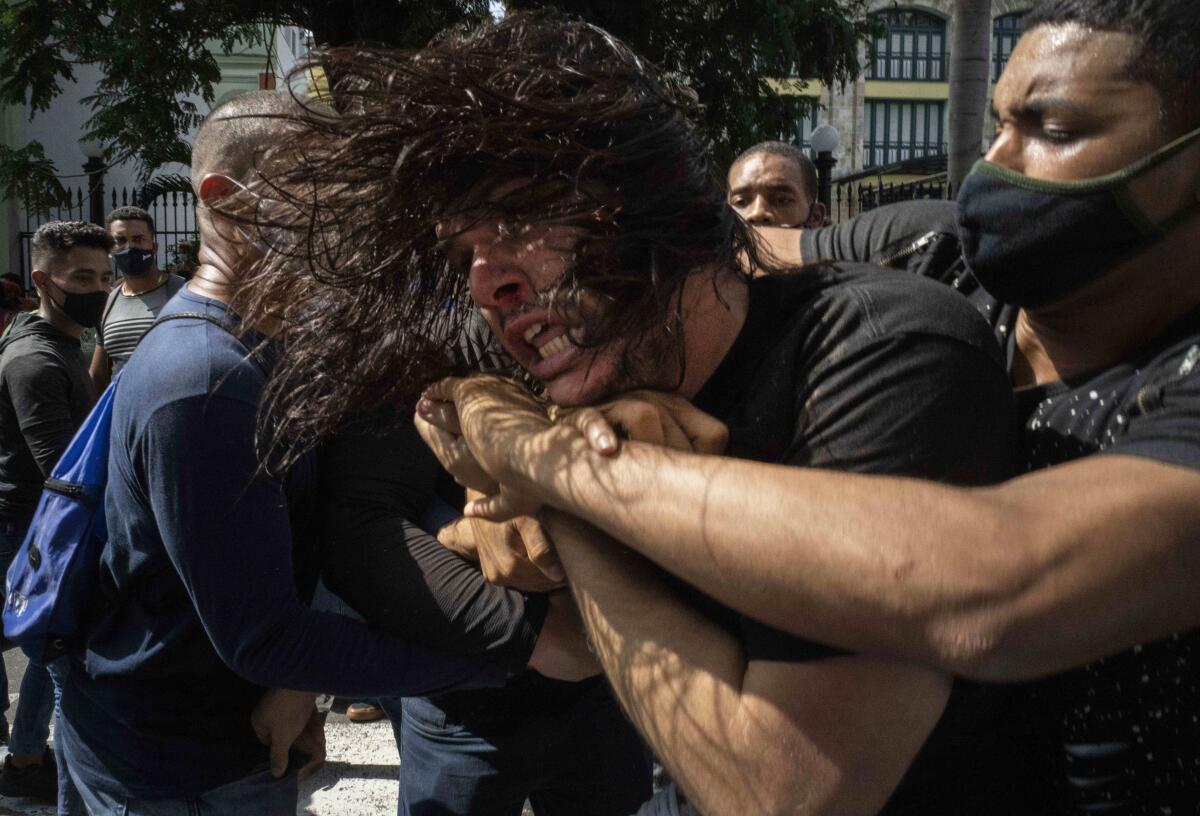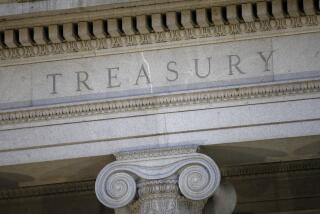Biden hits Cuba with more sanctions over its crackdown on protesters

- Share via
WASHINGTON — The Biden administration on Thursday announced a new round of sanctions against the besieged Cuban government for its violent crackdown on demonstrators, blacklisting the defense minister and a paramilitary police force.
Officials said the sanctions targeted specific members of the island’s authoritarian government who were deemed responsible for the repression of protesters demanding more freedom, food and healthcare. Hundreds have been beaten or arrested, human rights activists say.
The measures come as President Biden faces mounting criticism from hard-liners in both political parties in Congress seeking stronger retaliation against Cuban President Miguel Díaz-Canel and his associates.
“I unequivocally condemn the mass detentions and sham trials that are unjustly sentencing to prison those who dared to speak out in an effort to intimidate and threaten the Cuban people into silence,” Biden said in a statement. “The United States stands with the brave Cubans who have taken to the streets to oppose 62 years of repression under a communist regime.”
Named by the Treasury Department were a single, albeit powerful, individual, Armed Forces Minister Álvaro López Miera, and one entity, the feared Boinas Negras (Black Berets), a paramilitary police force used to break up many of the demonstrations. That security unit, however, was already blacklisted.
It was unclear what effect the sanctions would have since those targeted were unlikely to have assets in the U.S. or business dealings with U.S. firms, all of which are barred under the sanctions. The punishment comes under the Global Magnitsky Human Rights Accountability Act, a nearly decade-old measure initially designed to focus on Russia but expanded to punish abusers of human rights worldwide.
State Department spokesman Ned Price said the actions taken Thursday had bite. “This is part of our effort [against Cuba] that is not over, to be sure,” Price said in a briefing with reporters. “This will not be the sum total. ... We are going to hold to account Cuban officials and entities responsible ... for the violence, repression and human rights violations.”
Biden pledges to stand with Cuban protesters and calls on Havana to refrain from a violent crackdown. But U.S. officials deflect criticism for lag in policy changes.
Sen. Marco Rubio (R-Fla.), a prominent hawk on Cuba, said the key was to erode confidence within Cuba’s security forces.
“This is welcome additional pressure,” he said on MSNBC ahead of the formal White House announcement, “but more needs to be done.” He urged a diplomatic push by the Organization of American States and other regional bodies, with Washington in the lead.
The sanctions will also be seen as a nod to the battleground state of Florida, where immigrants from Cuba and other conflictive parts of Latin America, and their descendants, form a sizable voting bloc that often leans conservative and Republican.
Price acknowledged a certain symbolic value to ramping up pressure on the Cuban government. “There is an important messaging element,” he said.
Cuban Foreign Minister Bruno Rodríguez responded angrily to the new sanctions, saying that the U.S. should apply the same criteria and punishment to itself for the “acts of daily repression and police brutality” that killed numerous American citizens last year.
Writing on Twitter, he also criticized the State Department’s “offensive and humiliating” campaign to pressure European and Latin American countries to join in condemning Cuba. The White House has said it will attempt to enlist allies and other nations, through the OAS, United Nations and elsewhere, to present a united front against Cuban repression.
The U.S. has maintained a stifling economic embargo since the early 1960s, shortly after Fidel Castro led a revolution to topple a U.S.-backed dictator. Castro, who died in 2016, soon imposed one-party communist rule in Cuba and limited many basic political freedoms while improving health and education services for much of the population.
Biden and his advisors, early in his administration, said they would begin to relax some of the harsh measures imposed by former President Trump, who was reversing an opening overseen by his predecessor.
The Biden administration said it would revive travel between the U.S. and Cuba and make it easier for Cuban Americans to send remittances to relatives. That has not yet happened.
Biden said Thursday that officials were “reviewing our remittance policy to determine how we can maximize support to the Cuban people.” A remittance task force was set up this week to examine the issue, but officials have given no timeline for when to expect results.
An additional step the U.S. is contemplating, administration officials said, is to replenish the staff at the U.S. Embassy in Havana, which was all but closed under Trump.
In addition, many U.S. diplomats were removed after a mysterious affliction caused headaches, dizziness and serious brain injuries, a syndrome later detected harming U.S. officials in China, Europe and elsewhere. The symptoms could potentially have been caused by “directed, pulsed radio frequency energy,” according to a National Academies of Sciences report. Congress has ordered an investigation, and CIA Director William Burns has focused attention on the matter.
Augmenting the embassy staff would allow U.S. officials to provide consular services to Cuban citizens including visas. Currently, Cubans have to travel to a third country, usually Guyana, to obtain a visa that would allow them to travel to the U.S., an often prohibitively costly process.
More to Read
Get the L.A. Times Politics newsletter
Deeply reported insights into legislation, politics and policy from Sacramento, Washington and beyond. In your inbox three times per week.
You may occasionally receive promotional content from the Los Angeles Times.












